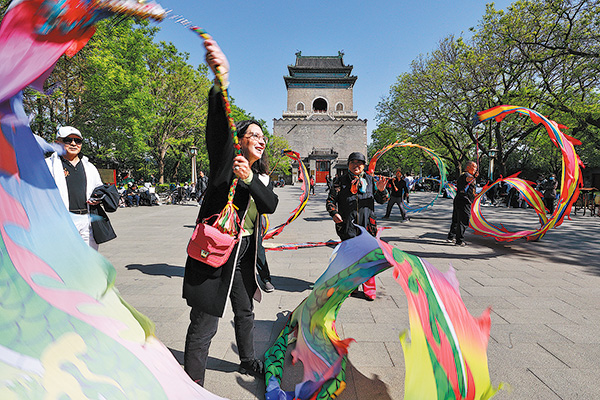

Du says he hopes that the joint efforts by Chinese and foreign judges will help promote cultural exchanges between China and foreign countries and advance mutual learning among world civilizations.
Candidates competing for the awards must demonstrate international vision and an authentic love for humankind, uphold the common values of humanity, and act on the vision of a global community with a shared future, according to the group.
They should also work in cultural sectors in a broad sense and actively engage in international cultural exchanges, make representative, marked and leading contributions in related fields, and demonstrate certain international influence.
The first Orchid Awards collected submissions from more than 300 individuals and organizations, including those from the United States, Japan, Germany, the United Kingdom, France, Italy, Russia, Australia, and South Africa.
Rosalind Oliver, director of the British Cultural Center at the University of Shanghai for Science and Technology, says that during the selection, she focused on how the candidates touched people's lives, including how they have done it, and why they are participating in the awards, as well as what they are doing to promote cultural exchanges and friendship.
"It's about the friendships they are trying to create among people and the understanding they are trying to develop," she adds.
Oliver has been engaged in promoting Chinese culture over the years. In 2005, she established the Double Dragon Alliance Cultural Center, which acts as a bridge for foreigners seeking to gain a better understanding of Chinese culture. The center supports kung fu masters in teaching martial arts and organizes seminars and events for people to experience various aspects of Chinese culture, including acupuncture, traditional medicine, calligraphy, painting and Peking Opera.
In 2010, Oliver was awarded the Member of the Order of the British Empire for her contributions to Sino-British relations and cross-cultural work.
She says that cultural exchanges play an important role in helping people to learn about each other's background, countries and traditions, which is much needed for a peaceful world.
Speaking about the significance of the awards, Oliver says mutual trust is important in cultural exchanges, so it is imperative to find people who are trusted by the public.
"We need to find the right people to spread culture and friendship,"Oliver says.
Having spent more than two decades in Shanghai, Oliver says she has felt secure and been warmly welcomed.
"As a woman, I feel safe, and this is important for women all around the world. You can be whatever you want to be, and your imagination is the only thing that limits you," she says.
"It's the people who give you the feeling you can achieve anything."
In China, she has practiced tai chi for many years and benefited from it. "It requires balance and contains many Chinese cultural aspects," she says.
"It's good for my body, and it can also be a method for dealing with mundane affairs," she says, adding that a person needs to balance themselves, their circumstances and family, as well as society.
Speaking about her most impressive cultural exchange experience, Oliver says it has come from her Chinese friends.
"My friends have been the warmest and kindest people that I have ever met in my life," she says.
When her husband passed away in 2003, she says her Chinese friends were very helpful and kept her company.
"They have been very tolerant and understanding, so it feels like home here."
James Heimowitz, president of the China Institute based in the US and a judge for the awards, says he looks for how contestants are able to reach a broad audience, and how authentic their voices are.
"We want to have people who have had their own primary experiences here, not listened to other people's narratives," he says.